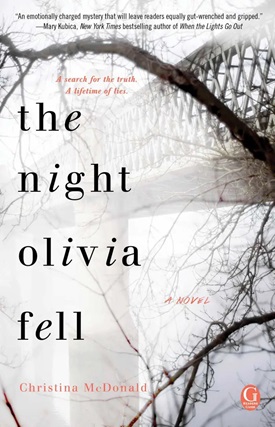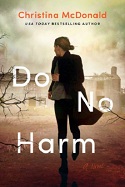 Synopsis:
Synopsis:
They said it was an accident.
In the small hours of the morning, Abi is startled awake by a phone call. She is informed that her teenage daughter, Olivia, has fallen off a bridge near the coast of Puget Sound in Washington State.
The doctors explain that not only is Olivia brain dead, but she’s also pregnant and must remain on life support in order to keep her baby alive. But then Abi sees the bruises circling Olivia’s wrists.
Her mother knows they’re lying.
When the police rule Olivia’s fall accidental, Abi is determined to find out what really happened. Was Olivia’s fall an accident? Or something far more sinister?
In The Night Olivia Fell, author Christina McDonald contemplates how well we ever really know our children, weaving a taut tale of family secrets and devastating lies.
Review:

Christina McDonald’s stunningly emotional debut novel, The Night Olivia Fell, focuses on a mother living out a parent’s worst nightmare who is determined to learn what really happened to her daughter on the night she fell from a bridge and was rendered brain dead.
It is an engrossing mystery in which McDonald challenges readers to ponder several questions. How well do you know your children? How well do they know you? It is a gut-wrenching, heartbreaking, and deeply moving story of a desperate mother trying to unravel the truth about how her seventeen-year-old daughter. And why she did not know that her daughter was pregnant.
When, in the wee hours of the morning, Abi Knight is awakened by the phone call every parent dreads, she doesn’t even know that Olivia, her daughter, is not in her room, safe and soundly asleep. Abi suddenly finds herself living out an unimaginable ordeal. She is informed that Olivia has been determined to be brain dead but, as a matter of law, must remain on life support to bring her unborn child to term.
When Abi arrives at the hospital and sees Olivia, she notes that there are bruises on Olivia’s wrists and the bracelet she always wears is missing. Nonetheless, the police don’t seem particularly interested in investigating the circumstances surrounding Olivia’s fall and, in fact, rule it an accident. Abi will have none of it and sets out on her own search for the truth about what occurred on that fateful night.
Abi has kept a secret from Olivia. She has never revealed the identity of Oliva’s father, nor has she ever explained to Olivia what he was capable of. However, unbeknownst to Abi, a chance meeting on a school trip with a girl who bore an uncanny resemblance to Olivia led her to her father. Intent on understanding why Abi kept the truth from her, Olivia confronted him and learned for herself what kind of person he is. When Abi discovers that, prior to her fall, Olivia knew more about the past than Abi realized, she is devastated . . . and highly suspicious.
McDonald effectively employs the alternating voices of Abi, in present day, and Olivia, commencing six months before her fall, to construct an absorbing, touching tale of a mother enduring an unspeakable tragedy. Her struggle is complicated and magnified by the issue of Olivia’s unborn child — the hellish months of seeing her daughter kept alive artificially in order to give the baby a chance at life, the unanswered questions about how Olivia ended up on the bridge in the first place, and the unknown identity of the unborn child’s father. McDonald’s portrayal of Abi’s anguish is believable and riveting, as is her fierce and tenacious commitment to uncovering — despite the police department’s disinterest — precisely what happened to her child. Equally engaging is the first-person narrative from Olivia as she explains how she encountered Kendall Montgomery, the girl who looked so much like her; her growing frustration with what she perceived as Abi’s over-protectiveness; and her secret relationship with her best friend’s brother. Through the two narratives, McDonald portrays a mother-daughter relationship with no shortage of love and care, but punctuated by secrets and resentments, as well. A relationship that is now forever beyond repair because Olivia will never regain consciousness.
At the heart of the story is the compelling mystery: What happened to Olivia on that night? What was she doing on the bridge? Who put those bruises on her wrists? And who is responsible for her death? Will that individual be held accountable?
The Night Olivia Fell is an intense, exhausting, but satisfying story. McDonald draws readers’ hearts and minds into the drama from the first page and never releases her grip until the very last page of the fast-paced thriller.The Night Olivia Fell is also a poignant reminder to hold our loved ones close and work daily on maintaining honesty and transparency in our relationships. Because you never know when tragedy might strike and steal away any opportunity to set things right. It is a powerful portrait of a mother’s undying love, devotion, and strength — a strength she didn’t know she possessed until she needed it to sustain her and her unborn grandchild. And an impressive and promising debut novel.
Excerpt from The Night Olivia Fell
Prologue
“You want the truth? I’m — ” My admission was cut off by a streak of blazing hot pain as something exploded against the side of my head. My brain barely registered the blow, my vision a dusky blur of red, pain searing into my skull and down my jaw. I felt my body spin with the force of it.
I reeled backward until my legs whacked against the low cement wall and I tumbled over, my body hurtling sideways across the ledge. A dark fog pressed against my outer vision, and before I knew it I was falling, plunging into empty space.
I hit the water on my back, my eyes fastened on the bridge’s soaring spires illuminated by a flickering streetlamp.
Then the shadowy water tipped me under.
Chapter 1 — Abi
October
I woke abruptly, dreams tumbling from me in cottony wisps. I couldn’t remember falling asleep, but the lamp on my bedside table had been switched off, the only light a full, glowing moon outside my window.
The phone was ringing.
“Olivia?” I murmured, hoping she’d get it so I wouldn’t have to. My daughter was one of those people who could wake up and fall asleep as if flipping a switch.
I rolled over and peered at my alarm clock. The red lights blinked 4:48 a.m. Nobody called at this time of night with good news.
I bolted upright and grabbed the phone, the feather duvet sliding from my body, leaving my bed-warmed arms cold and exposed.
“Hello?”
“Hello, is this Abigail Knight?” The voice—a man’s—was low and tight, coiled like a viper about to strike.
“Yes.”
“This is Portage Point Hospital. It’s about your daughter, Olivia. I’m afraid there’s been an accident.”
× × ×
I ran down the hall to Olivia’s room, cold wings of fear fluttering in my stomach.
Her door was shut and I threw it open thinking, irrationally, that she’d sit up in bed blinking her eyes at me sleepily. I imagined, hoped, that she’d be angry at me for invading her teenage space. She’d throw a pillow at me, and I’d laugh weakly, clutching my chest with one hand as my heart rate returned to normal.
“I had a terrible dream,” I’d say.
“I’m fine, Mom,” she’d reply, looking at me with all the scorn a seventeen-year-old could muster. “You worry too much.”
But her room was silent and empty, her bed a jumble of blankets. Dirty clothes spilled from the laundry basket in her half-open closet. Sheaves of paper were scattered in a disorganized jumble on her dresser.
I lurched out of the room, down the stairs, and into my car. Last night, at the Stokeses’ barbecue, she’d been fine.
But, no. I shook my head, really remembering. No, she wasn’t fine. She hadn’t been fine for a while.
Maybe it was just the typical moodiness of a teenager, but this felt different. Olivia was usually sunny and sweet. She was an easy teenager. The girl who never partied, got straight As, helped all her friends with their homework.
Lately she seemed distracted and temperamental, irritable whenever I asked what was wrong. And then there were the questions about her father.
She wants the truth.
The thought came fast, an ugly surprise. I set my teeth against it. I’d worried for so long that all the lies I kept hidden on the dark side of my heart would one day be washed into the open. These lies, my past, kept me always on guard.
× × ×
October drizzle coated the car, and a handful of brown leaves covered the windshield. The acidic feeling in my stomach clawed its way up toward my throat as I wrenched the car door open and threw myself inside. For once my old beater car started without any hesitation, as if it too knew we had to hurry.
I tore out of the driveway, my tires spinning in the gravel. I flicked the wipers on, but a single dead leaf was caught, wiping a jagged, wet arc across the windshield, back and forth, back and forth.
I thought of the last time I’d gone to the hospital with Olivia— she’d broken her arm falling out of the ancient willow tree in the backyard when she was ten. My guilt had been overwhelming. I’d failed at the most important job I would ever have: keeping her safe.
I gripped the leather steering wheel hard, securing myself to the present while the past threatened to overtake me. My wheels squealed as I whipped around a corner too sharply. I was being reckless, I needed to slow down, but Olivia . . .
I couldn’t even finish the thought. My daughter was my center of gravity, the only thing tying me to this earth. Without her, I’d surely float into space, a kite with its string severed by glass.
I pressed my foot hard against the accelerator as my knees began to shake. The decaying leaf was still stuck to the wiper but it had been ripped in half now, leaving the shape of a broken heart behind.
I braked sharply as I rounded the last corner and skidded into the hospital parking lot. It was nearly empty, one ambulance parked at the front, a handful of cars scattered across the lot. Streetlamps glinted against the wet pavement. I slammed on my brakes in a spot near the entrance just as the last half of the leaf in my windscreen was mercilessly ripped away.
× × ×
I staggered into the hospital, cracking my elbow hard on the sliding door. Pain seethed toward my fingertips but didn’t slow me down. I needed to find Olivia.
Please, please be okay.
A doctor appeared suddenly from a set of swinging doors. His steps were brisk, the swift, resolute walk of a man who knew what he was doing. Behind wire-rimmed glasses, his eyes were bloodshot when they landed on me.
“Abigail Knight?” I could just make out the clipped voice I’d heard on the phone. He had thinning white hair and a close-shaven face. Around his neck hung a stethoscope. His white coat had a rust-colored smear across the front.
He stepped closer and held one hand out to me. His eyebrows, thick as caterpillars, were pinched together.
“Where’s Olivia?” I gasped, feeling like I would hyperventilate. People were staring, but I didn’t care. “Where’s my daughter?”
I tried to sidestep him, but he moved his body to block me. “I’m Dr. Griffith.” He took a step closer. I could see the flecks of
gold in his brown eyes. “Will you come with me?”
“Why?” My voice sounded too high, the words crushed on my tongue. “Where’s Olivia?”
“I’m going to take you to her, but first we need to talk. Perhaps somewhere a bit more private.” The doctor’s tone conveyed the gravity of what he had to say. The weight of it kept the frantic questions in my throat from vomiting out.
I looked around at the busy waiting room. A handful of people openly stared at us, while the rest fiddled with cell phones or pre- tended to read newspapers.
I nodded, a small jerk of my chin.
Dr. Griffith led me through the swinging doors and down a brightly lit corridor to a private meeting room. The room smelled of floral potpourri and was decorated in pale pastels. The floor was shiny, the color of cinnamon, the walls a washed-out cream.
“Please. Sit.” Dr. Griffith motioned toward a cushioned taupe chair. I sat stiffly on the edge.
He crossed to a water cooler in the corner of the room. A hulking tower of plastic cups, white, like vertebrae, leaned on a low black table next to it. He swiped one and filled it with water. The cooler gurgled and belched as air drifted to the top.
He thrust the cup toward me, but I just stared at it. I couldn’t seem to get my hand to take it. Eventually he set it on the table.
Dr. Griffith dragged a plastic chair from the wall and placed it across from me. The scraping of its feet against the floor set my teeth on edge. He sat, planted both feet on the ground, pressed his elbows against his knees, and steepled his fingers, as if in prayer.
“There’s been an accident—” he said, repeating his earlier words. “Is Olivia okay?” I interrupted.
But the way he was looking at me. With pity. I knew.
An intense desire to run hit me. My shins still burned from my run yesterday morning, my thigh muscles ached, but I felt the pang hit my body hard.
I jumped up, looking around wildly. The doctor stood, eyeing me as if I were a wild animal. But the urge to know kept me rooted to my spot.
“Tell me. . . .” I rasped.
“Your daughter . . .” Dr. Griffith touched my forearm. His hand was heavy, cool against my clammy skin.
He said something about an accident.
Somebody finding Olivia at the bottom of an embankment near the ZigZag Bridge.
Something about a grand mal seizure, corneal reflexes, and a Glasgow score of four.
He said something about a head wound, about fixed and dilated pupils and a CAT scan.
That they’d taken her in for surgery as soon as she’d arrived. I couldn’t make sense of any of it.
I collapsed on the chair, bending forward until my head was between my knees, as if preparing for a crash landing. I could hear my heart throbbing in my chest, the blood roaring in my ears, the harsh hiss of my breath as it rushed in and out of me in sharp, hollow gasps. My elbow throbbed painfully where I’d banged it.
“No . . . no . . .” I pleaded over and over, clenching and un- clenching my sweat-soaked hands.
The doctor sat next to me, his voice breaking through the heavy, viscous bubble surrounding me.
“—sustained severe head trauma. I’m really sorry, Mrs. Knight, but your daughter has suffered permanent and irreversible brain damage.”
My mind reeled, trying to assimilate these facts into something that made sense. Shards of his words assaulted me through a roar of panic.
“Is there someone we can call . . . ?”
Who was there? My mom was dead. I never knew my dad. There was no husband, no boyfriend. I was too busy being a mother to date, too busy to have friends. There was only . . .
“My sister.” My voice sounded very far away, as if it came from down the hall rather than my own mouth.
I wrote Sarah’s number on a scrap of paper. He took it and opened the door, handed it to somebody, then sat back down across from me.
“I’m so sorry, Mrs. Knight, we did everything we could to save her, but Olivia won’t wake up. Right now she’s attached to life sup- port that’s keeping her body alive.” He licked his lips, on the verge of saying something else. “But she . . .”
“She’s an organ donor,” I whispered numbly.
It was what they wanted, wasn’t it? The day she got her driver’s license Olivia had signed up to save another’s life. “You know,” she’d said, shrugging with the confidence the young have that they’re im- pervious to death. “If it ever came to that.” My kind, gentle girl.
“No, that’s not — What I mean to say is, we can’t legally turn Olivia’s life support off in her condition.”
I didn’t understand. It was as if he had suddenly started speaking Urdu. A throb began pulsing under my eyes.
He cleared his throat, his eyes scurrying momentarily away from mine. “We can’t turn life support off from a pregnant woman. Not in Washington State.”
“Wh — ?” I breathed. My body went limp, boneless, my head spinning.
“Olivia was — is — Olivia’s pregnant.”
Excerpted from The Night Olivia Fell by Christina McDonald. Copyright © 2019 by Christina McDonald. Published by Gallery Books. All rights reserved.
Also by Christina McDonald:
Standalone Novels
Detective Jess Lambert Series








Comments are closed.